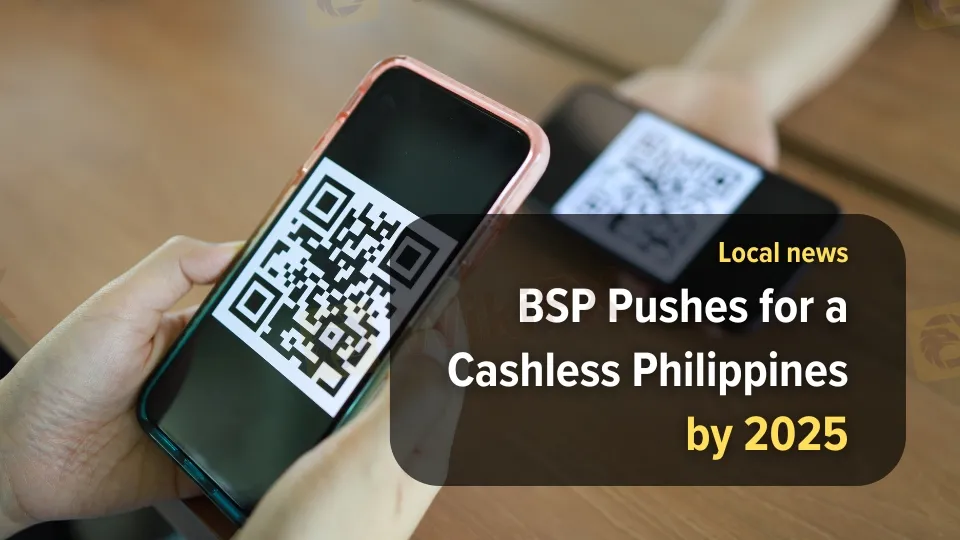简体中文
繁體中文
English
Pусский
日本語
ภาษาไทย
Tiếng Việt
Bahasa Indonesia
Español
हिन्दी
Filippiiniläinen
Français
Deutsch
Português
Türkçe
한국어
العربية
BSP Pushes for a Cashless Philippines by 2025
Abstract:The BSP accelerates cashless transactions, aims for a coin-lite society, eliminates small fund transfer fees, and drives financial inclusion by 2025.

The Bangko Sentral ng Pilipinas (BSP) is leading the charge to modernize how Filipinos transact by promoting digital payments and reducing reliance on cash and coins.
The Bangko Sentral ng Pilipinas (BSP) has set its sights on creating a more convenient, efficient way for Filipinos to manage their money. By 2025, the BSP envisions a “cash-lite” society, where digital payments become the norm but cash remains an option, giving people more freedom and flexibility.
Moving Toward a Coin-Lite Society
“We‘re aiming for a cash-lite society,” BSP Deputy Governor Mamerto Tangonan shared. “It’s not just about efficiency; its about giving Filipinos the choice to pay how they want, while also making financial services more inclusive.”
Under the BSPs Payments and Currency Management Sector (PCMS), the plan is to balance digital and physical currency. The goal? Ensure a smooth transition that benefits everyone, especially those who still depend on cash.
Where We Are Now
In 2023, the BSP produced ₱781.6 billion worth of banknotes and ₱10.3 billion worth of coins. While there was a slight dip in currency distribution, idle coins valued at over ₱1 billion were put back into circulation using BSPs coin deposit machines in malls.

During the pandemic, digital payments surged as people looked for safer, contactless ways to pay. Former BSP Governor Benjamin Diokno had predicted that this trend could make the country much less reliant on coins by 2025. However, Tangonan acknowledged that achieving this goal depends on measures like removing transaction fees for small electronic transfers and encouraging businesses to adopt subscription-based payment systems.
The Bigger Picture
The numbers tell a promising story. In 2023, over half of all retail transactions—52.8%—were done digitally, exceeding the BSPs goal of 50%. Looking ahead, the central bank wants online payments to account for 60-70% of all retail transactions by 2028.
But this isn‘t about pushing people to abandon cash entirely. “We want Filipinos to have options,” Tangonan emphasized. “Whether they choose cash or digital payments, it’s about giving them the tools to participate fully in the economy.”
Final Thought
The BSP‘s push for a cash-lite Philippines is about more than technology—it’s about creating a financial system that works for everyone. By 2025, this initiative could redefine how Filipinos pay, save, and interact with money, ensuring no one is left behind in the journey toward a more digital future.

Disclaimer:
The views in this article only represent the author's personal views, and do not constitute investment advice on this platform. This platform does not guarantee the accuracy, completeness and timeliness of the information in the article, and will not be liable for any loss caused by the use of or reliance on the information in the article.
Read more

Georgia Man Charged in Danbury Kidnapping and Crypto Extortion Plot
Georgia man James Schwab charged in Danbury kidnapping tied to $230M crypto heist. Plot targeted couple for ransom after Miami altercation with son.

Bybit Shuts Down NFT Marketplace Amid Crypto Market Downturn
Bybit announces the closure of its NFT marketplace, citing efforts to streamline offerings. Discover the latest trends in the declining NFT market and its shift to utility-based growth.

Galaxy Digital Settles $200M in Luna Token Manipulation Case
Galaxy Digital pays $200M to settle Luna token manipulation probe by NY regulators, linked to TerraUSD’s 2022 crash, impacting crypto market stability.

April Forex Trends: EUR/USD, GBP/USD, USD/JPY, AUD/USD, USD/CAD Insights
Know April’s forex seasonality trends for EUR/USD, GBP/USD, USD/JPY, AUD/USD, and USD/CAD. Historical insights and key levels to watch in 2025.
WikiFX Broker
Latest News
The Withdrawal Trap: How Scam Brokers Lure Victims into Paying More
FCA to Investors: Think Twice Before Trusting These Brokers
Trump\s tariffs: How could they affect the UK and your money
Trump gambles it all on global tariffs he\s wanted for decades
TradingView Brings Live Market Charts to Telegram Users with New Mini App
Trump tariffs: How will India navigate a world on the brink of a trade war?
IG Group Acquires Freetrade for £160M to Expand UK Investment Market
U.S. March ISM Manufacturing PMI Released
Should You Beware of Forex Trading Gurus?
Exposed by SC: The Latest Investment Scams Targeting Malaysian Investors
Currency Calculator


